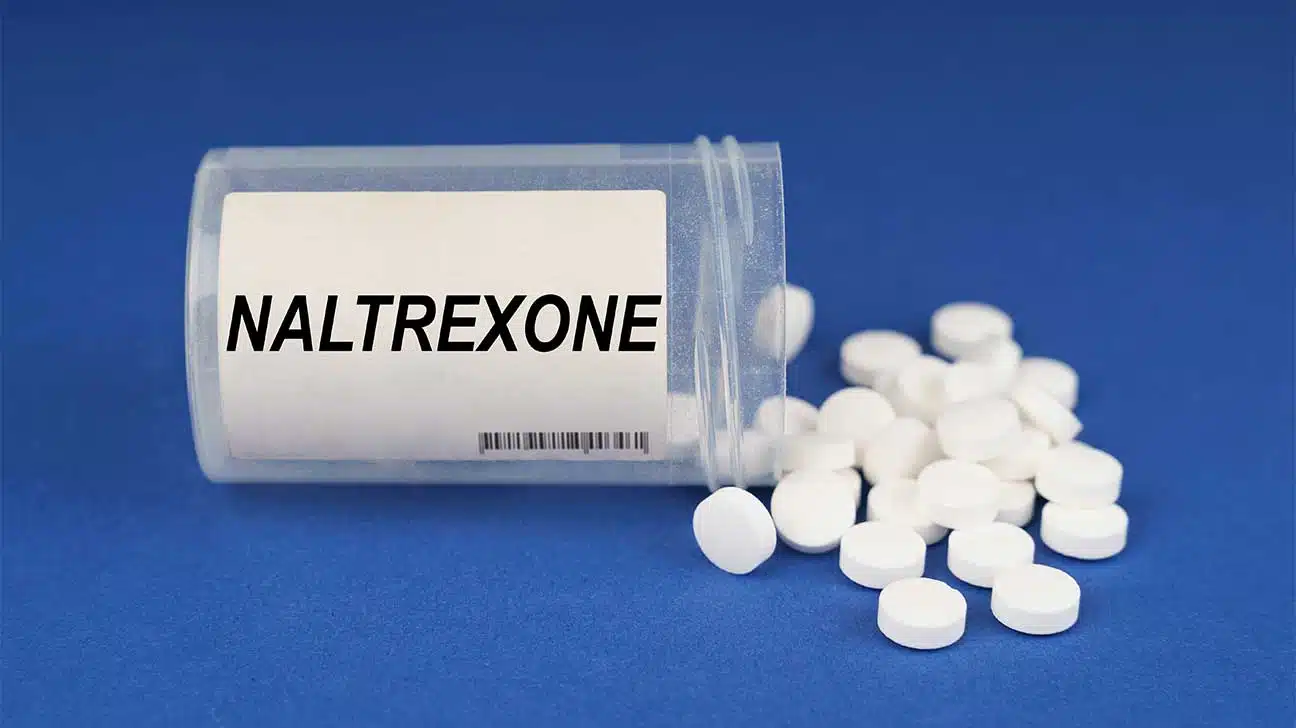
Throughout the coronavirus pandemic, many Americans have reported experiencing chronic symptoms post-COVID, including symptoms such as fatigue, pain, and brain fog.
To help address this, U.S. federal health agencies have been working to identify treatments capable of helping relieve long COVID symptoms, which for some can be debilitating.
One of those potential treatments includes naltrexone, a drug known for its use in treating addiction.
According to a recently published study, naltrexone is one medication that is showing some promise in helping lift long COVID brain fog as well as other commonly reported symptoms.
What Is Naltrexone?
Naltrexone is the generic name for a medication that is also prescribed under the brand names Vivitrol and Revia.
This medication is FDA approved for the treatment of alcohol use disorder and opioid use disorder.
However, low doses of naltrexone have also for years been used as a treatment for symptoms of various health conditions, including autoimmune disorders.
LDN has been used as a treatment for symptoms of:
- chronic pain
- fibromyalgia
- Crohn’s disease
- multiple sclerosis
- Alzheimer’s disease
- myalgic encephalomyelitis/chronic fatigue syndrome (ME/CFS)
How Does Naltrexone Treat Brain Fog?
Naltrexone is a drug with anti-inflammatory properties.
Researchers of a study recently published in the journal Brain, Behavior, & Immunity say that low doses of naltrexone may help treat underlying issues that cause long COVID brain fog.
Clinical trials involving long COVID patients showed promising results, although it is too early to declare naltrexone a “cure” for COVID-related cognitive impairment and neuroinflammation.
Furthermore, experts say naltrexone may not be effective for everyone with long-COVID, so it’s important to talk to your doctor about your full range of options.
Can Naltrexone Help Other Long COVID Symptoms?
Reduced brain fog is one of several improvements that people with long COVID have reported following the initiation of a treatment plan involving low doses of naltrexone.
Those taking naltrexone for long COVID have also reported improvement in:
- pain
- energy levels
- limitations in activities involved in daily living
- joint pain
- low mood
- concentration
- sleep quality
- chest tightness
- cough
It is important to note that these improvements may not solely be attributed to the use of naltrexone. Another pilot study evaluating LDN as a treatment is reportedly underway.
Improved symptoms from taking naltrexone for long COVID may contribute to better mood, well-being, and overall quality of life.
What Causes Long COVID?
The exact cause of long COVID is a subject of ongoing study.
According to Reuters, some experts believe this could be linked to a reduced function of natural “killer cells” in the immune system.
Others believe infectious diseases such as COVID trigger certain immune cells, known as microglia, in the central nervous system to create inflammatory molecules that can cause fatigue and “COVID brain.”
Low-dose naltrexone has shown to be helpful in treating some immune-related conditions and thus could help those with long COVID by helping address damage to the immune system.
Antihistamines and antidepressants have also been proposed as therapies for symptoms of long COVID, but there is no drug that has been formally approved for long COVID at this time.
Is Naltrexone Safe For Treating Brain Fog?
Naltrexone medications are generally believed to be safe for use.
LDN has been described as having a “high safety profile” with no major interactions with other pain medications or treatments for immunological disorders.
Potential side effects of LDN may include:
- nausea
- vomiting
- constipation
- fatigue
- stomach pain
- decreased appetite
- headache
Naltrexone And Addiction
Naltrexone is one of three addiction drugs that are FDA approved for the treatment of opiate or opioid use disorder, along with buprenorphine (Subutex, Suboxone), and methadone drugs.
These types of medications have also shown to be helpful for treating people with alcohol use disorder.
It is generally prescribed as a supplement to behavioral healthcare treatments for addiction, such as behavioral therapy, addiction counseling, and support groups as part of a holistic approach.
Finding Naltrexone Addiction Treatment
While the effectiveness of naltrexone for long COVID brain fog is still being studied, naltrexone has been approved as an evidence-based treatment for both opioid and alcohol addiction.
If you or a loved one is looking for addiction treatment options, call our helpline today to find treatment near you.
Addiction Resource aims to provide only the most current, accurate information in regards to addiction and addiction treatment, which means we only reference the most credible sources available.
These include peer-reviewed journals, government entities and academic institutions, and leaders in addiction healthcare and advocacy. Learn more about how we safeguard our content by viewing our editorial policy.
- Brain Behav Immun Health
https://www.ncbi.nlm.nih.gov/pmc/articles/PMC9250701/ - National Multiple Sclerosis Society
https://www.nationalmssociety.org/Treating-MS/Complementary-Alternative-Medicines/Low-Dose-Naltrexone - Reuters
https://www.reuters.com/business/healthcare-pharmaceuticals/addiction-drug-shows-promise-lifting-long-covid-brain-fog-fatigue-2022-10-18/ - U.S. National Institutes of Health (NIH)
https://www.nih.gov/about-nih/who-we-are/nih-director/statements/nih-launches-new-initiative-study-long-covid

